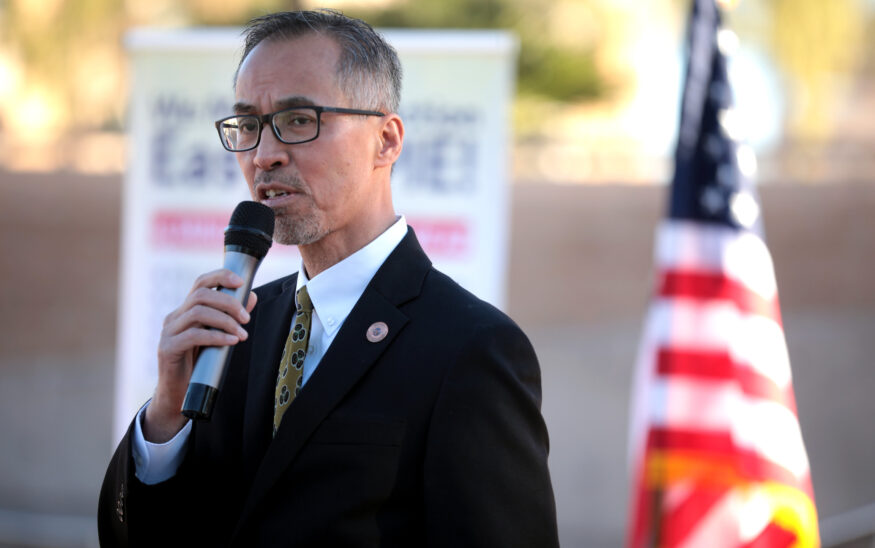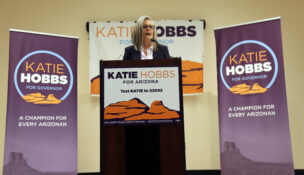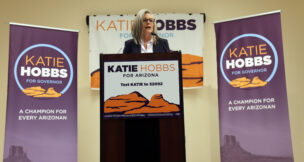Rep. Nguyen’s bill aims to make political killings a capital offense
Howard Fischer, Capitol Media Services//September 17, 2025//
Rep. Nguyen’s bill aims to make political killings a capital offense
Howard Fischer, Capitol Media Services//September 17, 2025//
Key Points:
-
Head of House Judiciary Committee aiming to make political assassination capital offense
-
Rep. Quang Nguyen wants to deter targeting people for political beliefs
-
Lawmakers often float ideas before bills can be filed on Nov. 17
The head of the House Judiciary Committee is crafting legislation to make political assassination a capital offense.
Rep. Quang Nguyen said he wants to deter anyone who would target people for their political beliefs. The Prescott Valley Republican said while it was the shooting death of political activist Charlie Kirk that spurred the idea, he said such legislation is necessary to prevent similar attempts on others in Arizona, regardless of where they are on the political spectrum.
He also told Capitol Media Services his legislation is crafted so that even unsuccessful attempts result in an automatic life sentence without the possibility of parole.
Separately, Senate President Warren Petersen wants lawmakers to approve a measure renaming a major freeway in and around Phoenix after Kirk. He said it will ensure “his legacy lives on.”
But in a press release — Petersen did not return repeated messages — the Gilbert Republican who is running for attorney general also inserted a religious component. He said renaming the freeway goes beyond honoring Kirk and is “a call for each of us to press on in faith, to live courageously for Jesus, and to stand firm in the principles Charlie so boldly championed.”
Neither of those is actual legislation, at least not yet. Bills for the 2026 session cannot be filed with the House or Senate clerk’s office until Nov. 17.
None of that, however, keeps lawmakers from floating ideas before then. And Nguyen said he already has approached House attorneys to help craft his measure.
The more far-reaching proposal — at least as relates to law and order — is the proposal about punishment for political assassinations.
Nguyen said he’s not looking to craft an entirely new law. Instead, he wants to add the fact that a killing was carried out for political purposes to the list of things that jurors can consider when deciding between a life sentence and the death penalty.
Under Arizona law, what might be called an ordinary murder does not make the perpetrator eligible for execution. Instead, jurors must find one or more “aggravating circumstances.”
These already include things like murder for hire, whether the victim was a peace officer, prior murder convictions and whether there was premeditation. There even is a provision for “premeditated and deliberate” murder of any elected or appointed official or candidate for office.
Nguyen, however, said something more is needed, something that covers anyone — public official or not — who is targeted based on political beliefs.
“In this country, you should be able to speak freely,” he said. And that, said Nguyen, includes Kirk.
“This is now not just an attack on Charlie Kirk,” he said. “And it is an attack on the American institution.”
Conversely, Nguyen said his legislation will cover only what prosecutors — and, ultimately, jurors — determine is a killing over political beliefs.
So, for example, he said, his legislation would not have applied in the case of murdered Arizona Republic newsman Don Bolles who died in 1976 after a bomb was placed under his car. In that case, the motive for the murder was to stop him from investigating real estate deals.
Nor, Nguyen said, would it apply if someone were to target him for assassination based on the fact that he is Vietnamese — or even his religion.
“If I’m a Catholic, which I am, and I said ‘I’m a Catholic’ and somebody shot me, that is not a political statement,” he said. “That is religiously being discriminated.”
This, he said, is different.
“If I speak about freedom and I speak about supporting President Trump and I’m speaking about recruiting young voters to become conservative and I’m being assassinated, that is clearly politically motivated,” Nguyen said.
So how does someone’s motive get ascertained?
“Criminals are not very bright,” said Nguyen. And he said they often leave behind other clues, including writings, website postings and even conversations with others.
“This is a necessity I see to deter bad guys from doing this stuff to both parties, Democrats and Republicans,” he said.
All that, he acknowledged, is based on the assumption that a death penalty or life imprisonment is enough to dissuade would-be shooters. And that presumes that some assailants are looking to make a statement and, in some cases, assume they are going to get killed in the attack.
“You can’t fix stupid,” Nguyen said. But he said if it prevents just one out of every 10 attacks, the proposal has served its purpose.
What Petersen is proposing, by contrast, is not based on deterrence but the argument there’s a reason to put Kirk’s name on the roadway which runs for 78 miles from central Phoenix, out to the eastern edge of Mesa and then circles back around through Chandler and back into the west side of Phoenix.
“Through God’s grace, by renaming this highway we can ensure that his name, his mission, and his witness to the gospel will endure for generations to come,” Petersen wrote in his press release. “Even in the midst of sorrow, God’s Word reminds us that hope endures.”
Merits of the measure and the political component aside, there may be legal issues.
Most notably, Arizona law declares that it is the State Board on Geographic and Historic Names that has purview, not only on what certain features like mountains and rivers are called, but also whether to put names on highways and “designate the most appropriate and acceptable names and spelling of these names for use in maps and other governmental documents.”
In fact, it was that board that voted in 2019 to designate the last 22-mile stretch of Route 202 as the Ed Pastor Freeway. That is the official name, with signs erected to that effect by the Department of Transportation.
“The intention is not to remove that name,” said an aide to Petersen. However, she did not explain how it would coexist with the Senate president’s proposal, dubbed the Charlie Kirk Memorial Loop 202.
And there’s something else.
That law — the one that gives the naming power to the state board — specifically says it cannot commemorate anyone “until that person has been deceased at least five years.”
The board has ignored that requirement in the past, as it did in 2003 when it renamed a mountain and a Phoenix freeway that runs adjacent to it in honor of Lori Piestewa. That year, she was the first Native American woman to die in combat while serving in the U.S. military and the first woman in the U.S. military killed in the Iraq War.
In that case, however, some other circumstances may have resulted in board approval.
Both the mountain and freeway had been named Squaw Peak, a name that then-Gov. Janet Napolitano — who appointed most of the board members — said is offensive to many tribes.
A spokesman for Gov. Katie Hobbs, asked about both measures, said his boss does not comment on bills she has not yet seen.














































